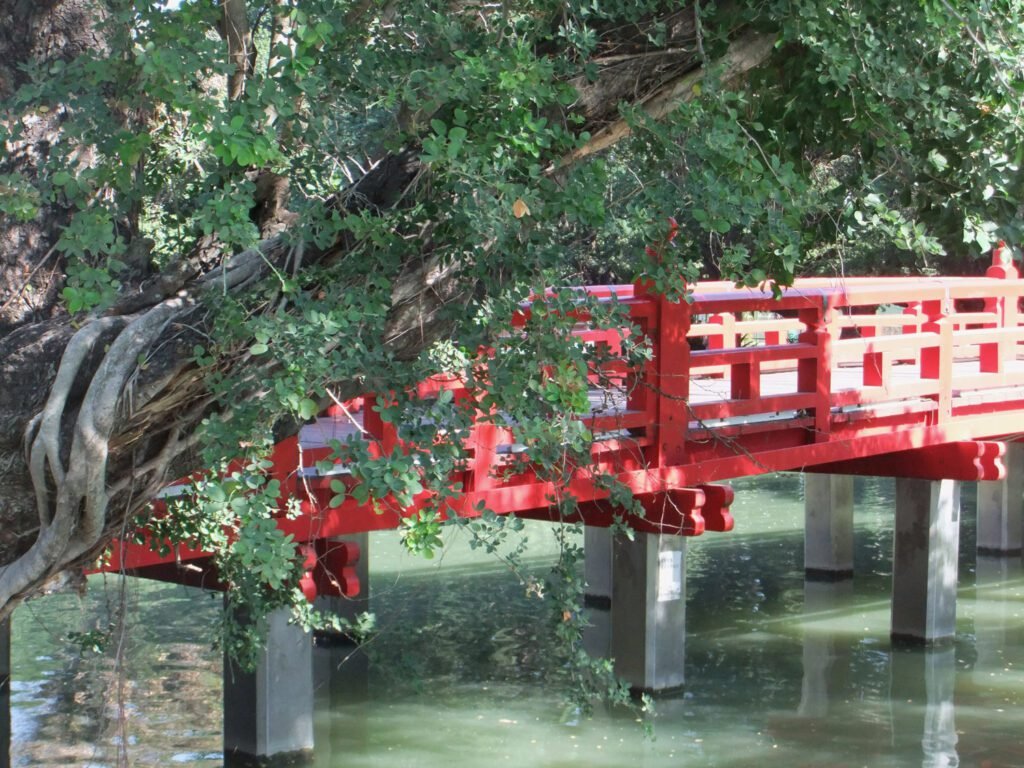We don’t just plan our trips to get from one place to another. We plan to contain uncertainty. To make sense of it. To make the unfamiliar feel manageable.
But the irony is this: in tidying up the unknown, we risk erasing the very thing that makes travel worth doing — the possibility that something unscripted might reach us. Something unexpected. Unwritten. Quietly magical.
I once set out in Kyoto to find a particular Zen garden I’d read about — famous, serene, meticulously raked. After nearly an hour of walking, I hadn’t found it. I did find other temples, of course — quiet, beautiful — but what I remember most is not the architecture. It’s the enormous clap of thunder that cracked the afternoon wide open.
The sky darkened, and the rain came fast and hard. I never did find the garden. Instead, I spent the next twenty minutes weaving through Kyoto’s backstreets, ducking under awnings, half-laughing at the absurdity of it all. And somehow, that mad, rain-soaked retreat back to the hotel lodged itself in my memory.
It wasn’t what I’d planned. But it’s what stayed.
The Myth of “Getting It Right”
There’s a particular kind of planning that masquerades as wisdom: the spreadsheets, the cross-checking, the itineraries that leave little to chance. It all sounds sensible. And often, it is. But if we’re not careful, we end up organising ourselves out of the very experiences we hoped to have.
Looking back, some of my most vivid memories aren’t from the tours I signed up for — but from the ones I quietly opted out of.
During a coach tour through Italy that I took with a friend some years ago, I remember little detail of the official sightseeing stops. The major attractions blur together. What I do remember — sharply and fondly — are two things:
First, the delightfully cheeky gay couple who turned out to be the best companions one could ask for, the joy of life they exuded a true tonic.
And second, the day my friend and I skipped one of the “optional extra” excursions and set out to explore the streets of Venice on our own. Later, in Tivoli and then Rome, we did the same. We wandered, stopped for cake or pizza or gelato when we felt like it, and let the day unfold without oversight or commentary. It was, frankly, bliss.
In Vietnam, it happened again. Faced with another pricey “must-do” day tour in Ho Chi Minh City, we gave ourselves permission to say no. Instead, we walked. We found ourselves at the Jade Emperor Pagoda, with its turtle-filled pond and incense-infused quiet.

We visited Notre Dame Cathedral (the Vietnamese one, not the Parisian one), wandered past Reunification Palace, and cooled off in a tiny pho restaurant where the soup was divine and the air-con blessedly chill.
None of this was scheduled. All of it felt real.
The Case for Structured Looseness
Planning is not the enemy. But rigidity might be.
These days, I tend to book accommodation in advance — but I look for places with flexible cancellation. That way, if a city doesn’t hold me the way I thought it would, I can pivot without penalty. Or if a detour calls, I can follow it.
I like to have one or two anchor points per day — something fixed, like a concert, a timed attraction entry, or half-day tour. But around that? Space. Time. Silence, even. You’d be surprised how much meaning sneaks in when there’s room for it.
And rather than rewriting the itinerary when I feel the urge to stay longer, I simply take note. That little pull, that resistance to moving on — it’s information. Sometimes I act on it if I can, sometimes not. But the noticing is part of the journey.
And of course, it’s not about avoiding missteps — it’s about knowing you can course-correct. You’re not locked into a bad decision. Even the most regrettable booking has an exit strategy.
A Lesson in Letting Go (and Upgrading)
I learned this early on, during my first solo trip to New York.
I’d booked two nights in a budget backpacker hostel — more about frugality than wisdom. It turned out to be…well, awful. A tiny cubicle, filthy sheets that I suspected (actually, I knew) were shared with generations of bed bugs, and a communal shower I could hardly bring myself to walk into.
After one restless night, I decided I didn’t need to prove anything. I abandoned the second night, hailed a cab, and moved — with enormous relief — into a real hotel near Times Square. It was clean. Quiet. Civilised. I remember the feeling of drawing the curtains in a room that didn’t smell like despair. It felt like reclaiming something.
Yes, I lost a few dollars. But I gained comfort, confidence, and the understanding that a poor decision doesn’t require stoicism. It just requires a change of plan.
What Happens When You Leave Space?
Unexpected things unfold. Not dramatic plot twists, but small, human encounters that shape the texture of your trip.
- You pass a tucked-away courtyard café and step in — not for coffee, but because the clink of glasses and low murmur of conversation pulls you. You stay longer than you mean to.
- A taxi driver in Orlando, Florida hears your voice and instantly pegs you as being from Melbourne. Not just Australia — but Melbourne. He then proceeds to demonstrate an unnervingly accurate grasp of regional Australian accents. It’s both flattering and mildly unnerving.
- You spend an hour or so in a park in Taichung, Taiwan, just after dawn. A group of men and women are doing tai chi under the trees, the morning sun just beginning to brush the tops of the lotus lilies in the pond nearby. You weren’t planning to stop — but you do. You watch. You breathe. You carry that quiet moment home with you, long after the flight.
These are not Instagrammable highlights. They don’t slot neatly into travel brochures. But they are yours. And they are what travel is really about.

From Itinerary to Inner Compass
We often overplan not because we’re organised, but because we don’t entirely trust ourselves. Perhaps we’re afraid we’ll be bored. Or lost. Or disappointed.
But midlife offers us a chance to rewrite that script.
At this stage, we’re not chasing validation or collecting passport stamps to prove a point. We’re looking for something quieter. More honest or adventurous. Maybe even more ambiguous.
When you let go of needing every day to “count”, you start noticing what actually does.
Practical Magic: A Few Quiet Experiments
These are not rules. Just gentle invitations.
- Choose accommodation with flexible terms. It offers structural freedom.
- Anchor your days, but don’t chain them. One or two fixed or planned activities per day is plenty. You can always change your mind.
- Allow time for aimlessness. Spontaneity is important. You might just discover something memorable.
- Shift cities during daylight hours when you can. It slows the pace and wakes the senses.
- Let the small things matter. Like the sound of footsteps. A stranger’s kindness. The colour of the evening sky.
Applauding the Gaps
The memories that last are rarely the ones you paid for in advance. They’re the things that happened while you weren’t looking. The ordinary that became extraordinary, simply because you had space to notice it.
Planning is wise. But overplanning is a like putting on armour — a way to avoid the awkward edges of uncertainty.
If you can resist the urge to fill every space, every gap, you’re allowing something else to arrive.
And it may be exactly what you didn’t know you needed.
Related Posts
- Midlife, Unscripted: Finding Yourself Through Solo Travel
- 10 Questions to Ask Yourself Before Booking Your Next Solo Adventure
- A Tale of Two Beds: Welcome to Intermezzo Adventures
Disclosure: Some of the links on this page are affiliate links, which means we may receive a small commission (at no further expense to you) if you click through and make a purchase. As an Amazon Associate we earn from qualifying purchases from Amazon websites.

Leave a Reply